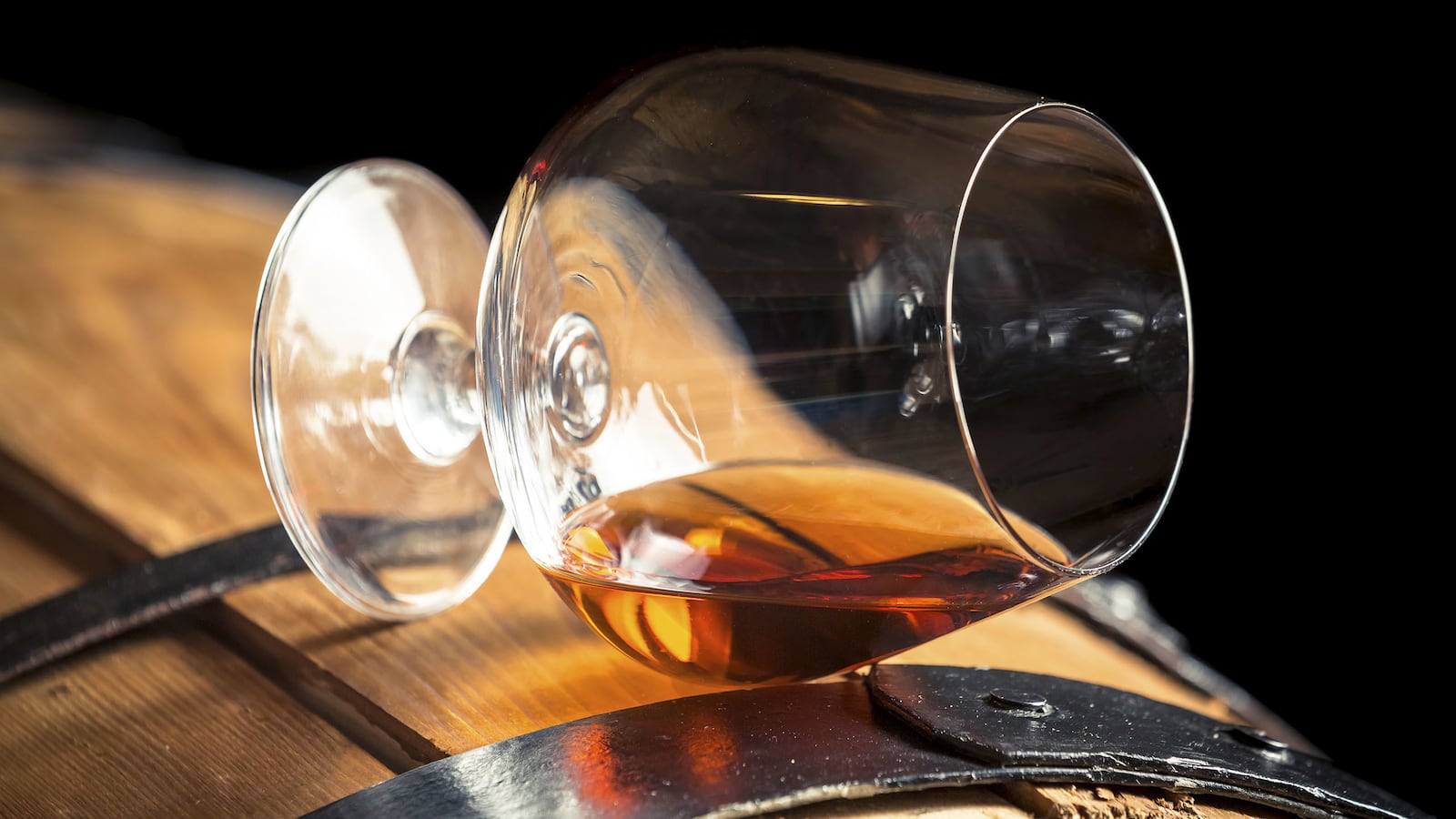Read the promotional materials for the Rancho de Los Luceros Destilaría and you form an image of a supremely artisanal effort. The distillery creates “small batch heirloom spirits handcrafted in New Mexico.” Each batch of their rye whiskies, vodka, and gin is “individual and unique,” and “each bottle is hand bottled and hand marked with batch and bottle number.”
These are the standard selling points of the craft-distilling movement, with its locavore lingo, terroir talk, and handmade hype. But, in the new crowd of micro-distillers, it is now standard for the alcohol being sold to come not from their own distinctive stills, but from a hulking factory in Indiana.
Lawrenceburg, Indiana (not to be confused with bourbon-locale Lawrenceburg, Kentucky) is home to a massive brick complex that cranks out mega-industrial quantities of beverage-grade alcohol. The factory, once a Seagram distillery, has changed hands over the decades and was most recently acquired by food-ingredient corporation MGP. It is now a one-stop shop for marketers who want to bottle their own brands of spirits without having to distill the product themselves. MGP sells them bulk vodka and gin, as well as a large selection of whiskies, including bourbons of varying recipes, wheat whiskey, corn whiskey, and rye. (They also make “food grade industrial alcohol” used in everything from solvents and antiseptics to fungicides.) Their products are well-made, but hardly what one thinks of as artisanal. And yet, much of the whiskey now being sold as the hand-crafted product of micro-distilleries actually comes from this one Indiana factory.

Upstart spirits companies selling juice they didn’t distill rarely advertise the fact. But there are ways to tell: whiskey aged longer than a distillery has been in business is one of the telltale signs that the “distiller” is actually just bottling someone else’s product. KGB Spirits, the company behind the New Mexico “destilaría,” was founded in 2009; but its flagship Ceran St. Vrain straight rye whiskey comes with an age statement of 15 years in the barrel. Or take Breaker bourbon, the “first bourbon produced in Southern California since Prohibition.” The Buellton, California company behind the brand, Ascendant Spirits, wasn’t started until 2013. Yet, they brag their “ultra small batch bourbon” is aged 5 years. So how do you open a distillery one year and have 5- or 15-year-old whiskey to sell the next? Not by making it.
“I have purchased hundreds of barrels of rye and bourbon from them,” John Bernasconi admits when asked about the Indiana factory. A principal in the New Mexico company, Bernasconi says that purchasing whiskey from MGP and bottling it is “a means to develop a brand and help fund the next step” of actually distilling a unique product. It may be a sensible enough business strategy, but as whiskey writer Charles Cowdery points out, “There’s no reason to think anyone knows how to make whiskey or can learn how to make whiskey based on buying whiskey.” Cowdery has been railing for years against the proliferation of what he calls “Potemkin distilleries,” many of which own shiny new copper stills to wow visitors, but actually sell factory-made spirits they’ve acquired in bulk.

High West hopes to make the transition, at least in part. The Park City, Utah distillery has been celebrated for its well-aged rye whiskies and its bourbon-and-rye blends, all of which come from the Indiana factory, as owner David Perkins readily acknowledges. High West makes some un-aged spirits and they are currently aging some whiskey of their own, but they have no plans to stop using the whiskies available from Lawrenceburg. “Since MGP whiskey is [more than] 80 percent of my revenues, it might be silly to wean myself off of that,” Perkins says. “I don’t think my employees would like the pay cut!”
Part of the problem is the competition. MGP has plenty of aged whiskey ready to go in the bottle right now. An upstart distiller has to buy a still and learn how to use it; then buy all the ingredients and actually ferment and distill them; buy barrels and build or lease warehouses in which to put them; and then sit on the investment for years. Todd Leopold, master distiller at Denver’s Leopold Bros., has managed to do it. But how much easier, he says with disdain, for those who just buy whiskey off the shelf and market it. “All that they do is hire salespeople, make up a BS story, and boom, they look like a distillery,” Leopold says.
Dozens of new brands are packaging whiskey bought in bulk from Indiana. But it isn’t the only source. Some recently launched whiskey brands, such as the much-hyped WhistlePig Rye (which touts the product as “hand-bottled” on a Vermont farm), get their product from a factory distillery in Canada. Others are picking up cast-off barrels from high-volume Kentucky “macro-distillers” who occasionally find themselves with more whiskey than they can sell under their own labels. But Cowdery warns that the newbie “distiller” shouldn’t count on finding brilliant whiskies in the barrels being shed by the big brands: “They’re not getting rid of their best stuff.”
The Indiana distillery, by contrast, does sell its best stuff, because MGP Ingredients doesn’t have any brands of its own. Originally, the rye that was made there had a particular purpose—as a component to “flavoring whiskey” in the Seagram’s Seven Crown blend. But it turns out that the rye in MGP’s warehouses, when not used for blending, is very good whiskey all on its own—one more reason why the industrial product is behind so much of the “craft” rye revolution.
The most obsessive tracker of MGP whiskies is a food blogger known as “Sku.” He is Steve Ury, and on his Recent Eats blog he has published a near-comprehensive list of more than four-dozen brands bottling Indiana whiskey. He identifies the rye or bourbon from MGP in offerings from Arizona (Copper City) to Washington, D.C. (Filibuster), from Vermont (Smugglers’ Notch) to California (Hooker’s House). There has even been a boutique Indiana brand (W.H. Harrison) bottling factory-made Indiana bourbon.
Some on the long list own up to the source of their whiskies, but many do their best to suggest they’ve made it themselves. “New companies want to sell product as local or artisanal, and so that’s what they claim,” says Ury, who has been trying to do something about the practice. By day, Ury is a lawyer, and he has been needling the federal Alcohol and Tobacco Tax and Trade Bureau to be more aggressive in enforcing regulations requiring that whiskey bottles disclose where the spirit inside was distilled.
It isn’t just small start-ups using MGP rye. Though Bulleit is owned by drinks behemoth Diageo, the highly touted brand maintains a craft whiskey vibe, especially Bulleit Rye. The brand’s website says that “High rye content has always been the signature of Tom Bulleit’s distinctive bourbon. It was only a matter of time before he created a rye whiskey.” But “creating” isn’t the same thing as “distilling,” and, as Bulleit Rye properly discloses on its back label, the whiskey in the bottle comes from Lawrenceburg, Indiana.
Some of those bottling and branding MGP whiskey make an effort to give the juice some sort of finishing touch to make their product distinctive. George Dickel Rye starts with MGP whiskey but charcoal-filters it before bottling. Angel’s Envy buys Indiana rye, puts it in old rum casks to soak up a little sweetness, and then charges a hefty markup. Others, such as Redemption Rye, present their MGP whiskey as-is.
The prize for the most upfront bottler has to go to Blaum Bros. of Galena, Illinois, which market Knotter—read “not our”—Bourbon with the transparent admission “We didn’t distill this bourbon. Nope, not a drop.”
Templeton Rye, by contrast, has built its successful brand on being a product of Templeton, Iowa. They tell an elaborate story about how their recipe was used by the owner’s family to make illicit whiskey in Iowa during Prohibition, and how that rye had become Al Capone’s favorite hooch. They publish a description of their “Production Process” so detailed it lists the temperature (124 degrees) at which the “rye grain is added to the mash tank.” They brag that they focus their “complete attention on executing each step of the distillation process.” And yet, for all this detail, the official “Production Process” somehow fails to mention that Templeton doesn’t actually do the distilling.
Dig around enough on the Templeton Rye website, and you’ll find acknowledgment that their whiskey is factory-made in Indiana. But clinging to the craft distiller fiction, Templeton does its best to maintain that, rather than taking MGP whiskey off the shelf, they are somehow instructing the manufacturer how to make the juice.
“The smoke and mirrors used in this industry make it extremely difficult,” complains one micro-distiller who actually makes his own whiskey. “When one company talks about their heritage recipe that was a favorite of a gangster, even though it is just the stock MGP recipe, we all suffer,” because customers feel burned.
Another challenge actual craft distillers face is that the armies of new rye drinkers have come to expect whiskey with a particular flavor—that is, the taste of MGP rye. “If you’ve tried Dickel rye, Redemption, and Templeton, you’d think that’s how rye whiskey should taste,” says Clay Risen, author of American Whiskey, Bourbon & Rye. MGP’s whiskies are marketed under so many different labels that they “have colored perceptions” of what rye should be.
Which isn’t to say that no one succeeds in actually making their own craft-distilled whiskey. In addition to Leopold Bros. in Colorado, there are distillers such as Few in Evanston, Illinois, Catoctin Creek in Virginia, and Hudson Whiskey in New York state making good young rye from scratch.
Some of those selling MGP-made whiskies, such as High West’s David Perkins, would like to see a new transparency in the business. John Bernasconi of New Mexico’s KGB Spirits says, “I would welcome more disclosure and honesty in the spirits industry.”
A good idea, since there’s no reason to expect the ocean of Indiana whiskey to dry up anytime soon. Finding itself at the heart of the craft whiskey craze, MGP has cranked up its production, including a growing slate of new whiskey recipes offering customers greater variety.
Potemkin distillers are going to have all the juice they need for years to come.




